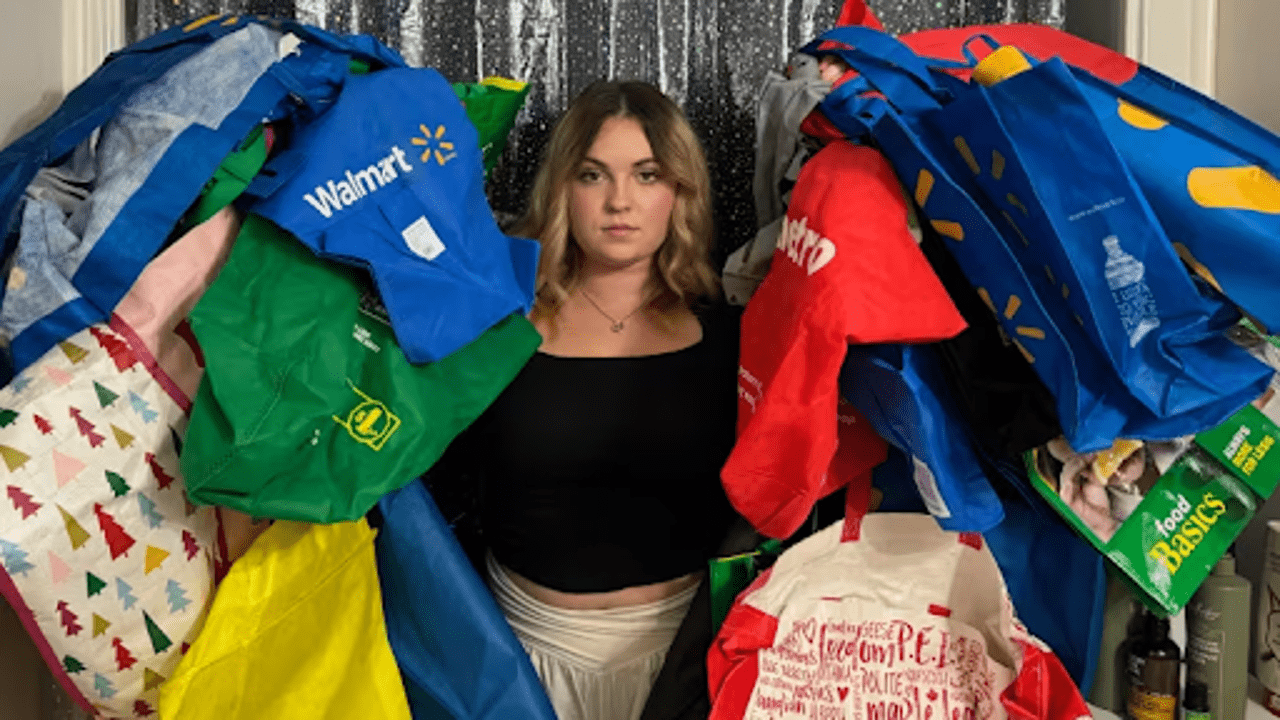
Megan Bishop of Sault Ste. Marie, Ont., would like to see retailers offer solutions to the problem of Canadians stockpiling too many reusable bags. (Carly Shoup)
We've all been there—standing in line at the grocery store, realizing we forgot to bring our reusable bags. Begrudgingly, we buy more, adding to the growing pile at home. This common frustration has even inspired a viral TikTok song.
Megan Bishop, a college student from Sault Ste. Marie, Ontario, recently posted her version of the song, sharing how she and her roommates tossed 175 reusable bags that had accumulated over time. Now, they're collecting even more. "We're human, we forget our bags at home, and we have no choice but to buy them again," said Bishop. She believes retailers should offer better alternatives, but suspects the profits from reusable bag sales are a deterrent.
"Retailers need to prioritize the environment," Bishop added, urging businesses to look beyond profits.
In 2022, Canada introduced a ban on single-use plastics, including checkout bags. Though the regulations are being challenged in court, they remain in effect, leading to an unintended consequence: a surge in reusable bag usage. While these bags are intended to reduce plastic waste, studies show they need to be used multiple times to have a positive environmental impact. However, many end up in landfills because they're not easily recyclable.
While shoppers are encouraged to remember their bags, environmentalists argue that retailers should do more. Solutions like in-store return programs, where customers can drop off unwanted bags for reuse, are recommended. Unfortunately, major retailers have not adopted such systems, raising concerns that profits from reusable bag sales are a barrier.
"Reusable bags are a big revenue generator," said Renee Lundahl, co-founder of GOATOTE, a company offering bag reuse programs. In 2022, major retailers like Walmart and CVS in the U.S. launched pilot projects in partnership with GOATOTE. Despite early excitement, none became permanent.
"Retailers are interested in piloting, but not in scaling," Lundahl explained, adding that profitability concerns often get in the way.
The reusable bag market is booming. According to Zion Market Research, the global market was valued at $11 billion USD in 2023, with projections reaching $15 billion USD by 2032. Retailers are expected to benefit most from this growth.
In Toronto, grocery stores like Loblaws and Walmart offer reusable bags starting at 33 cents. Only Walmart responded to CBC's inquiries, with a spokesperson stating that their popular blue bag, priced at 33 cents, isn't a "profit-driver." Walmart also introduced a program where customers can mail back unwanted bags for recycling or donation. However, environmentalists criticize this, arguing it puts the burden on consumers without addressing the root problem of overconsumption.
Some stores are exploring more innovative solutions. Penguin PickUp, for example, offers a circular system where customers can return bags for a donation or cashback. Returned bags are washed and resold, prolonging their life before disposal.
Environmentalists like Emily Alfred argue that government intervention is necessary to compel retailers to invest in sustainable programs. Some provinces, like British Columbia, have introduced regulations, such as charging a minimum of $2 for reusable bags. Still, no laws mandate that the profits be reinvested in circular systems.
The federal government has acknowledged concerns about reusable bag stockpiling but has yet to propose a concrete solution. "Changing behavior takes time," said Environment Canada spokesperson Samantha Bayard.















